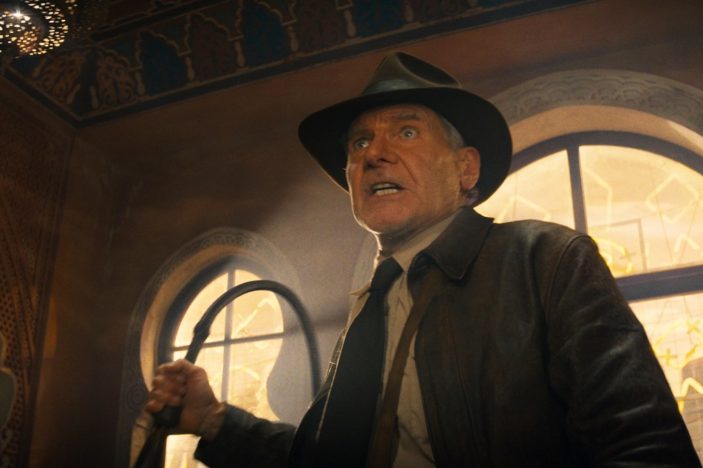
There’ll always be a certain excitement in seeing Harrison Ford don a fedora and crack the whip when embodying one Indiana Jones. After a tight, though not always flawless, original trilogy across the 1980’s (Raiders of the Lost Ark in 1981, Temple of Doom in 1984, and Last Crusade in 1989), many believed the magic was lost when it came to 2008’s Kingdom of the Crystal Skull; the pulpy tone was appreciated, as was Ford’s return, but a mismanaged script, over-use on CGI, and a tonally unbalanced climax seemed to send the series itself off on an underwhelming note.
There’s a certain sense of irony then that in another return for Indy, Ford’s presence is once again welcome, but he’s let down by many of the issues that plagued Crystal Skull, despite the fact that he’s surrounded by a heft of creatives all capable of better. For Indiana Jones and the Dial of Destiny, Steven Spielberg has vacated the director’s chair – though he is involved as an executive producer – with James Mangold (Logan) stepping up to the plate, sharing screenwriting credits with Jez Butterworth (Edge of Tomorrow), John-Henry Butterworth (TV’s Nine Perfect Strangers), and David Koepp (Panic Room); hardly names to feel uncertain about.
For better or worse, Dial of Destiny starts off on the most (whip) cracking of starts, with an extended action sequence set in (and then on) a train during World War II. Utilising de-aging technology, Ford is on hand in these early sequences as a more youthful appearing Jones, and when he doesn’t move or talk too much it doesn’t look half-bad. But, of course, this being an Indiana Jones movie, he does move and talk a lot during an exposition-heavy set-piece that sets us up as an audience for the adventure to follow, an adventure that involves the titular Dial of Destiny and the Nazis – specifically mathematician Jürgen Voller (Mads Mikkelsen) – who are after the Archimedes creation, believing it can help locate cracks in time that essentially allow the holder to travel into the past.
Given all the supernaturally-inclined adventures Indy has partaken in over the course of the series, the allure of time travel isn’t the most outlandish, and, initially, Dial of Destiny seems as if it’s going to handle such an outlet in the spirit of its predecessors; Crystal Skull‘s alien reveal not withstanding. Unfortunately, Dial of Destiny disintegrates with a finale that feels wildly out of tune with the taxing 154 minutes that run prior, ultimately resulting in an ending that has little-to-no weight regarding the film’s narrative or to its characters.
It’s a shame, too, as there are moments within Dial of Destiny that speak to the obvious talent and action capabilities of those involved. Ford’s iteration of Jones has never been to play alongside an archetype such as James Bond – it’s been to counterbalance such an aesthetic – and as much as he’s having fun here (as much fun as someone as gruff as the character is), there’s a certain magic missing. But when the film fires on all cylinders, it really gives it a red hot crack at holding its own against the previous series entries and adventure titles of the same ilk; the aforementioned opening train sequence and a gloriously chaotic chase through the streets of Tangier speaking to Dial of Destiny‘s promise.
If there’s one thing Dial of Destiny gets right however – and it isn’t giving Mikkelsen enough villainous material to chew on – it’s the inclusion of Phoebe Waller-Bridge. An actress capable of melding intelligence and humour with an effortlessness that doesn’t undercut the other (a shout out to the perfect television that is the two seasons of Fleabag), her Helena Shaw, Jones’s goddaughter and the daughter of Basil Shaw (Toby Jones), a former Indy ally whose obsession with the Dial drove him mad in the lead-up to his death, proves far more than just a damsel in distress or a mere female sidekick. She’s the catalyst for much of the film’s movements, and with motives of her own Waller-Bridge is afforded a depth that hasn’t always been expressed to female characters within the series.
Indiana Jones, as a character, deserves a better send off than what Dial of Destiny extends. The scrappy practicality of the original trilogy has been lost to grander set-pieces and an over-reliance on CGI, exorcising significant charm in the process. For a fifth film, and one that seems to directly lean into a sense of nostalgia throughout, it’s ironic that the long-time fans are likely to turn the dial back on this, leaving this film’s destiny in the hands of the casual viewer who may not feel so precious about what’s unfolding on screen in relation to what we know Doctor Jones is capable of.
![]()
![]()
![]()
![]()
![]()
TWO AND A HALF STARS (OUT OF FIVE)
Indiana Jones and the Dial of Destiny is now screening in Australian theatres.
